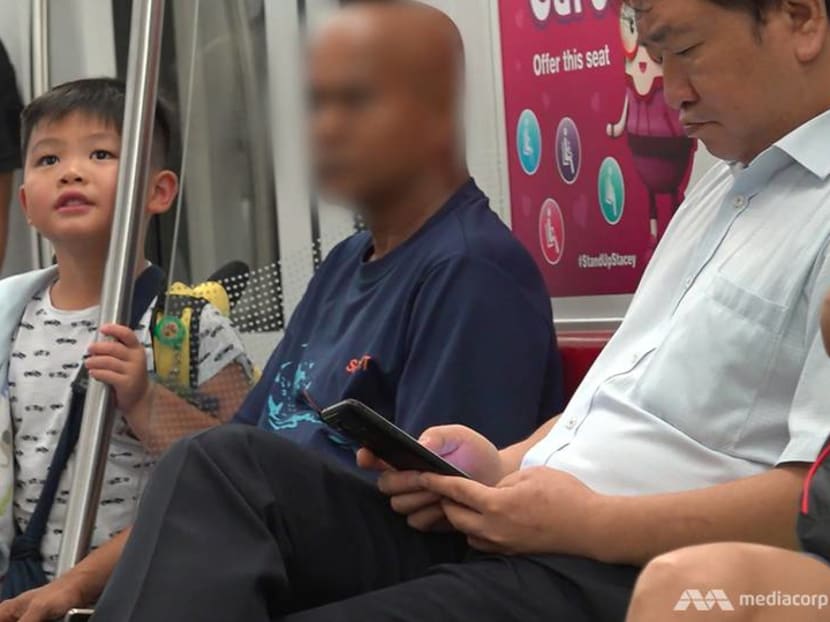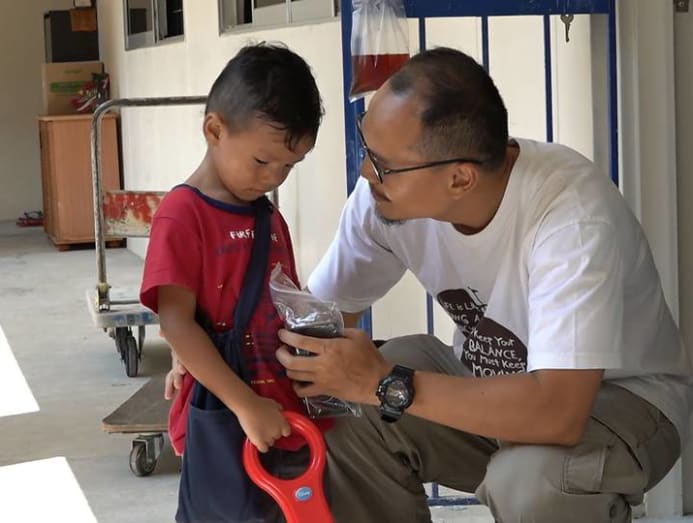Commentary: How old is ‘old enough’ when it comes to toddlers running errands on their own?
If two-year-old toddlers on Japanese reality TV can run errands by themselves, perhaps our children too can surprise us if given the opportunity, say Annie Tan.

SINGAPORE: Two weeks ago, I saw a four- or five-year-old boy sticking awkwardly out of a stroller he had evidently outgrown. Instead of energetically stepping off at the bus stop, the boy hugged a bolster impassively as his 60-something grandmother struggled to push the stroller off the bus.
When I caught the Japanese show Old Enough! on Netflix recently, this encounter flashed in my mind.
The boy in the stroller lay in jarring contrast to the children on the show, many of whom were as old or younger than him. Tasked by their parents to run solo errands, they braved traffic, asked for directions, paid for merchandise and delivered items to their family.
It is not just Japanese pre-schoolers who possess such commendable tenacity and independence. When Mediacorp made a Singapore version in 2019, local pre-schoolers set out on similar missions, and completed them unharmed.
But the rest of us still strap our little and some not-so-little ones into strollers and cart them around. We trail our children closely, picking up after them, even throwing their rubbish for them though the dustbin is a few small steps away. Today’s harried parents may find it quicker to just do things ourselves, instead of instructing, nagging, waiting, watching the kids do so.
I’m sure I’m not the only parent who watched the show and wonders if my children will be capable of doing the same. And on this Mother's Day (May 8), I ask myself if it would do them good to be given more responsibilities.
HOW OLD IS OLD ENOUGH?
To be fair, both the Japanese and local adaptation of the Old Enough! series are more reality TV than real life. The children and the routes they took were carefully selected, and the crew were present the whole way to ensure their safety and stepped in to help when necessary.

Outside of the show, it appears that Japanese children only start commuting to school alone in elementary school from the ages of six or seven, according to online newspaper Japan Today. That is also around the age they start to run solo errands in the neighbourhood.
But it is precisely because these scenes are so atypical that we find them riveting. With bated breath, we watch as toddlers in squeaky shoes set out on big adventures, laugh as they get distracted, fret as they get lost and celebrate their hard-fought victories.
However, even in the safest countries, many parents may bristle at the idea of sending such tiny tots on solo expeditions. There are obvious road risks, the risk of getting lost and stranger danger.
When our parents were growing up, children used to do the same. My aunt was only six or seven years old when she first went to the provision shop five minutes away to buy bread for the family. Sure, some of the risks loom larger today – more cars, denser housing estates, more people. What else has changed since?
OUR INDOOR HDB CULTURE
Younger generations of parents have been accused of helicopter parenting, characterised by overprotectiveness and excessive involvement in our child’s life. This highly involved parenting style even led to the coining of another term in recent years: Bulldozer parenting – those who go out of their way to make their child’s life easier by bulldozing obstacles in their path.
Why have we changed so much? Is it just because we have more resources and fewer children?
Perhaps that is only half of the answer. The other half could be that unlike our parents’ generation, children today spend little time outdoors - something the pandemic brought to new extremes. Singapore children spent only one to two hours outdoors per day on weekend, fewer on weekdays, according to a local study.
When outdoors, our children tend to be accompanied by a parent, grandparent or helper. They may get fewer opportunities to solve their own problems or even make their own friends.
It is not surprising then that children may not know how to anticipate dangers, fix problems or approach an adult for help. I noticed that sometimes, even if my child knows to ask an adult for directions or for help to pass her an item that is out of reach, she may lack the confidence without a bit of prompting.
As parents, it may be good to carve out more time for outdoor experiences so our children develop more confidence and street smarts. It also helps to fight the instinct to rush in to clear obstacles and solve problems for them.
IT TAKES A VILLAGE
That said, it may be a while before I allow my four-year-old to run errands on her own.
I occasionally send her to order food and purchase items while standing a good distance away, and I also encourage her to approach serving staff for help or befriend other kids on her own. And while she hesitated at first, I have seen her grow in confidence and gradually relish her newfound independence, sometimes volunteering without any prompting.
But call it a parent’s paranoia, I don’t feel reassured sending her out alone on longer errands.
Most of the children on the Japanese TV show live in rural areas – countryside villages and seaside towns with less traffic. In Japan, special yellow flags are placed at some stoplights for children to hold as they cross the road so that drivers will slow down.
Singapore is a bustling city with heavy traffic, busy junctions, and impatient drivers and commuters. In 2021, 107 people died and 7,184 were injured in traffic accidents, according to the Singapore Police Force.
My daughter has had a few close shaves with cyclists on footpaths within our HDB estate and even at the park, where children should be able to run more freely. In a couple of instances, I was told off by cyclists for not holding her hand and keeping a tighter rein on her.
Is our definition of “good parenting” in Singapore somewhat bizarre? Unlike in some rural communities where many adults pitch in to watch out for children, parents in Singapore seem to be expected to constantly watch their own children and keep them from trouble.
Case in point: On a few occasions when my daughter wandered slightly further in a mall, or took a detour from me on the way home and was out of sight for a couple of minutes, random aunties took it upon themselves to chastise me for “losing my child”.
While I agree that parents should be mainly responsible for their children, surely “good” parenting and “well-behaved” kids don’t mean they must be glued to our sides?
It would give me more confidence to let my young child do more on her own if I felt there were a greater sense of communal responsibility for the vulnerable. As the Japanese narrator pointed out, “It takes a town to raise a child, and a town to look after one.”
WATCH: On The Red Dot | Old Enough! — These kids cross the road alone for the first time (23:04)
As parents, it would be a huge reassurance to know that cyclists and cars would gladly slow down for our kids, bus drivers would remain stopped until young children are safely seated, and other adults would readily go out of the way to guide and help solo kids should the need arise – rather than wagging fingers at parenting they somehow judge to be “negligent”.
With a bit of mindset shift on the part of parents and society, Singaporean children too can develop more self-sufficiency and street smarts, and perhaps run errands on their own by the time they reach primary school.
Our children have proven time and again that they are more capable than we give them credit for. They should be charting their own adventures rather than spacing out on strollers or having their parents clear every part of the path ahead.
Annie Tan is a freelance writer based in Singapore.










